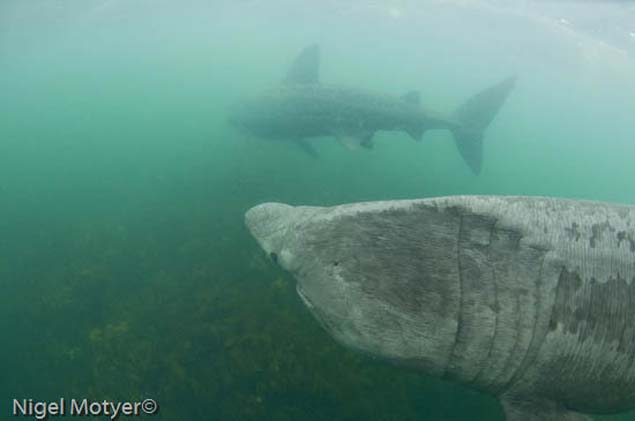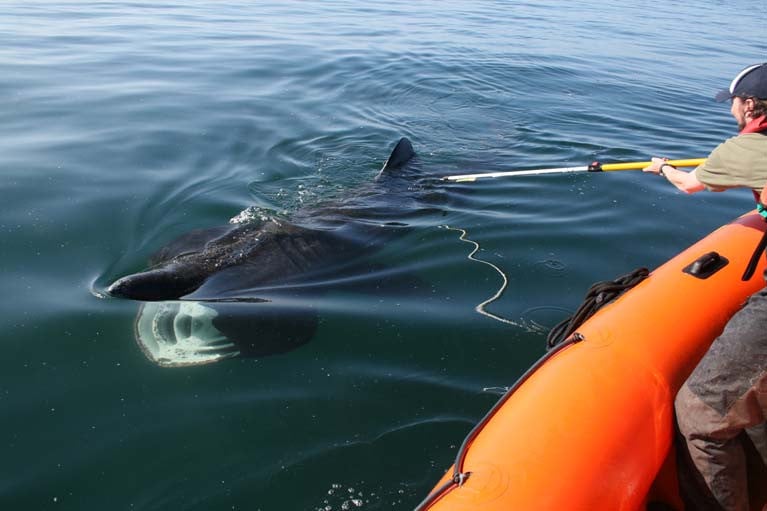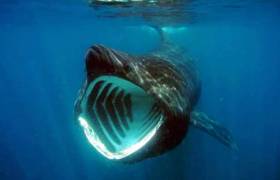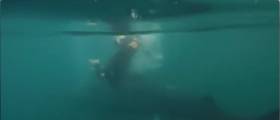Displaying items by tag: basking shark
Basking Sharks Arrival on West Coast Raises Questions
What significance is there in the first arrival of a basking shark in Irish waters this year being spotted on the West Coast?
It is not the earliest date of arrival of a basking shark. It ranks as the third earliest in IWDG records. But it has created a lot of interest because of where it was seen and the month in which it arrived.
Basking sharks have a long association with Irish waters, going back to the earliest recording of their presence in 1739. In 13 of the last 23 years, the first arrival of this species, the second-largest living shark and fish, plankton-eating, creating no danger to humans, was along the South/West Coast and in the Celtic Sea.
This year the first basking shark seen in Irish waters was recorded by Pat Concannon who runs the ferry service out of Cleggan to Inisbofin Island in Co.Galway, on February 19.
The IWDG ‘sightings scheme’ collects reports on behalf of the Irish Basking Shark Study Group, a good example of research groups working together on the conservation of iconic marine species.
“This wasn’t just another basking shark-sighting record, it was way more important, as it is our first shark record of 2024,” Padraig Whooley, Sightings Officer of the Irish Whale and Dolphin Group, told me. “We hear from colleagues in the research community on both sides of the Atlantic, that a broad range of marine species are either arriving at different times, usually earlier, or showing up in different places, usually further North.
“We are currently experiencing something similar in Ireland and the IWDG’s sighting and stranding schemes provide us with useful insights as to how our whales and basking sharks are coping in a rapidly changing seascape. During 2023 we received and validated 156 sightings of the planet’s second largest shark and fish.
“One big question is whether these spatial and temporal changes are something they have voluntarily opted into or are they a response to the general climate malaise and specifically to rising sea temperatures and how are they adapting to these changes?”
Social Democrats Call for Protection Plan for Basking Shark
Legislation to protect the basking shark in Irish waters has been welcomed by the Social Democrats but the party has called for a protection plan for the fish.
As reported by Afloat, the protective measures for basking sharks under the Wildlife Act were signed into law by Minister for Marine Charlie McConalogue and Minister of State for Heritage Malcolm Noonan.
Social Democrats climate spokesperson Jennifer Whitmore had introduced her own legislation to protect Ireland’s basking sharks last year.
“For too long, Ireland has lagged behind other countries when it comes to protecting these beautiful creatures,” she said.
“I am delighted my first Dáil Bill has laid the basis for legal protections for the basking shark,” Whitmore, a former marine biologist, said.
“. However, it has taken the guts of two years for the government to make it this far, an incredibly slow turnaround time when it comes to biodiversity governance,” she said.
“Not only do we need to enhance biodiversity, we need to protect what we have - and treasure out natural heritage, our biodiversity and our own iconic species,” she said.
“Ireland has been an international outlier for some time in not protecting basking sharks. It is therefore vital that this statutory instrument addresses the huge gap in protections that Ireland affords these magnificent creatures,” she said.
“While I welcome steps to put this species on the red list, it is essential these new protections are implemented with sufficient resources to ensure the population of basking sharks is not only protected but afforded the potential of increasing in numbers and thriving in Irish waters,” Whitmore added.
“As it stands, they continue to be under threat from boat strikes, harassment by recreational boat users and habitat alteration through the development of large-scale infrastructure,” she said.
“I would urge the Minister for Heritage to proceed, as a matter of urgency, to develop a protection plan with the necessary resources to proactively protect and enhance basking shark populations off our coast,” she said.
The two ministers said a code of conduct for the wildlife watching industry is currently being prepared by the National Parks and Wildlife Service to “guide responsible and safe interaction with the basking shark in Irish waters”.
This code “will ensure that there is strong awareness of and accordance with best practice for operators and the public in observing or encountering marine wildlife such as basking sharks and marine mammals”, they said.
Legislation to Protect Basking Shark Signed into Law from Today
Legislation giving the basking shark “protected wild animal” status has been signed into law by two Government ministers.
The move, which was first announced last March, has been made official by Minister of State for Heritage and Electoral Reform, Malcolm Noonan, and Minister for Agriculture, Food and the Marine, Charlie McConalogue.
Noonan said he has made regulations under Section 23(2)(a) of the Wildlife Act 1976, entitled the “Wildlife Act 1976 (Protection of Wild Animals) Regulations 2022.”
The effect of these regulations is to confer “protected wild animal” status on the basking shark under Section 23 of the Act.
 Basking Shark in Inishtrahull Sound off the coast of Donegal
Basking Shark in Inishtrahull Sound off the coast of Donegal
Where an animal is protected under Section 23 of the Act, it is an offence to:
- Hunt a protected wild animal (unless under permission or licence granted by the department);
- Injure a protected wild animal (unless done while hunting in accordance with a licence or exemption cited above); or
- Wilfully interfere with or destroy the breeding or resting places of a protected wild animal.
As the basking shark is a species of fish, under Section 23(3) of the Wildlife Act 1976, Noonan said he may only make such regulations to protect it with the agreement and co-signature of the Minister for Agriculture, Food and the Marine.
 Two Basking Sharks pass Malin Head on their annual migration
Two Basking Sharks pass Malin Head on their annual migration
The regulations have legal effect from Monday, October 3rd, 2022.
The basking shark is a globally threatened species which faces a high risk of extinction, Noonan’s department said.
The International Union for Conservation of Nature (IUCN) classifies it as ‘endangered’ on its Red List of globally threatened species, with its status changing from “vulnerable” to “endangered” globally in 2019.
Irish waters constitute one of the most internationally important coastal regions for the species.
“Protected wild animal” status will give basking sharks important additional protections and contribute to Ireland meeting its obligations under international law, the Department of Housing, Local Government and Heritage said.
It said a code of conduct for the wildlife watching industry is currently being prepared by the National Parks and Wildlife Service to guide responsible and safe interaction with the basking shark in Irish waters.
This code “will ensure that there is strong awareness of and accordance with best practice for operators and the public in observing or encountering marine wildlife such as basking sharks and marine mammals”.
“We are living in an age of mass extinction,” Noonan said.
“ There is an urgent responsibility on all of us to do everything we can to reverse that trend. By strengthening protections for the basking shark, Ireland will play its part in offering improved protection to an endangered species that depends on our territorial waters to survive and flourish,” he said.
“This measure is a first step in additional protections for vulnerable species in Ireland,” he said.
“ My department is working to further strengthen our wildlife laws to ensure that natural habitats are protected and restored and to provide a better balance of safeguards for both marine and terrestrial wildlife,” Noonan added.
McConalogue said he was “ delighted to be introducing this measure”.
“In addition to this measure, my department continues to support conservation efforts for this species through the SeaMonitor project, a transboundary research initiative that is focused on developing research links between Irish marine research teams and our international partners,” McConalogue added.
The Department of Housing, Local Government and Heritage said work is also underway to review the Wildlife Act, as per the Programme for Government.
The sighting of a big number of basking sharks off Hook Head is “an incredible start” to the 2022 basking shark season, according to the Irish Basking Shark Group.
It is one of a number of sightings in the past week, reported from the Aran Islands and from Baltimore in West Cork. For several years the first sightings of the year have been reported in March, some even as early as February, more regularly in April. As well as Cork and Galway sightings of early arrivals have previously been noted in Kerry, Donegal and Waterford.
Historically, basking sharks were hunted along the West Coast of Ireland. According to records 12,000 of the sharks were killed close to Achill Head.

The sighting off Hook Head is of particular interest to the Irish Basking Shark Group because of the numbers. It was reported by Charlie O’Malley on March 24 - six to eight nautical miles off the Hook. He estimated there were between 100 and 150.
Because of their declining numbers, basking sharks are to be protected in Irish waters under the Wildlife Act.
Listen to my Podcast here for more details of the Hook Head sighting.
Queen’s University Belfast Unravels Winter Movements of Basking Sharks
Queen’s University Belfast has released new research which has revealed that basking sharks overwintering in tropical waters off Africa experience cooler temperatures than those remaining in Ireland. The research, published in Environmental Biology of Fishes 2022, provides evidence to challenge previous assumptions that their disappearance from Irish coastal waters was linked to their search for warmer waters.
The research team equipped four basking sharks with pop-off archival satellite tags off Malin Head, County Donegal to record water temperature, depth and location over a six-month period.
Basking sharks are a regular visitor to Ireland’s shores in summer months. It has been widely believed that basking sharks prefer the warmer waters and that their seasonal disappearance is linked to falling water temperatures. Through the tracking devices, the research team discovered that two of the sharks travelled vast distances to the subtropical and tropical waters off Africa whilst the others remained in Irish coastal waters throughout the winter. The sharks off the coast of Africa experienced colder temperatures daily than the sharks that resided in Ireland, suggesting that they didn’t move south simply in search of warmer conditions. The cooler temperatures experienced off Africa resulted from the sharks diving each day to depths of up to 600m, most likely in search of prey.
Dr Emmett Johnston, Lead Author from the School of Biological Sciences at QUB said: “Our findings challenge the idea of temperature as the main reason for winter dispersal from Ireland. Likewise, further evidence of individual basking sharks occupying Irish coastal waters year-round has significant implications for national and European conservation efforts. Now we know that basking sharks are foraging at these depths, it shows that these habitats should be considered alongside coastal hotspots in future conservation efforts.”
And Dr Jonathan Houghton, Co-author from Queen’s, added: “This study tempts us to think about basking sharks as an oceanic species that aggregates in coastal hotspots for several months of the year (most likely for reproduction), rather than a coastal species that reluctantly heads out into the ocean when decreasing water temperatures force them to.”
Co-author, Dr Paul Mensink from Western University, Ontario, added: “Our findings highlight the need to understand the role of deep, offshore foraging habitats for a species so commonly sighted just a few metres from our shores.”
The international team will continue to monitor basking sharks as part of the EUSeaMonitor project to help inform and develop a collective conservation strategy for wide ranging species that have inhabited our waters for millennia.
A group of international scientists is marking world ocean day by calling for legal protection of the basking shark in Irish waters.
Ireland has a global responsibility to protect the world’s second-largest shark and fish – known as Liabhán chor gréine, or the “great fish of the sun” – the scientists state.
In an open letter appealing to the Government, the scientists explain that Irish coastal waters are “one of the few places globally” where basking sharks “regularly and predictably occur on the surface close to shore”.
“This surface swimming behaviour is the root of its deep cultural connections with western Irish coastal and island communities,” the scientists say.
The number of breeding individuals has been estimated at approximately 8,000-10,000 worldwide, most of which are in the north-east Atlantic.
The scientists believe section 23 of the Wildlife Act should be amended to protect the endangered species.
They explain that emerging scientific evidence indicates Irish territorial waters host a large proportion of the global population. Yet, Ireland is “one of the few remaining nations in the north-east Atlantic that have not provided domestic legal protection” for them.
“ While there is a moratorium on deliberately fishing for or landing the basking shark, significant challenges remain,” they state.
“ Current threats to the survival of these magnificent animals include harassment and disturbance, ship collisions, and entanglement,” they state.
Basking sharks were hunted by the Irish whaling industry in the early 18th century, including off Achill, Co Mayo where thousands of sharks were caught and processed for their liver oil until the 1970s.
“ It may be a surprise for some to hear that it was legal to fish for the basking shark in Irish waters until 2001 and not prohibited in all EU waters until 2006,” the scientists say.
“ Due to these unsustainable practices, the shark is now classified by the International Unio for the Conservation of Nature (IUCN) as endangered in the northeast Atlantic,” they state.
The basking shark was added to the Convention on Trade In Endangered Species (CITES) in 2003 and the Convention on Migratory Species (CMS) in 2005.
The scientists have initiated a petition to back their call. Social Democrat TD for Wicklow Dr Jennifer Whitmore has initiated a bill in the Dáil seeking to amend the Wildlife Act to protect the species.
Irish Basking Shark Group founding member Dr Emmett Johnston said “we are privileged to have such a wonderful animal frequenting our waters, which are some of the most important globally for this endangered species”.
“The scientific community have given their full support to list the basking shark under Section 23 of the Wildlife Act, now is the right time to protect them and their habitats”
Signatories include with Dr Johnston include fellow basking shark group founding member Dr Simon Berrow, Galway-Mayo Institute of Technology; Dr. Phillip Doherty, University of Exeter; Dr Kevin Flannery, Irish Elasmobranch Group; Pádraic Fogarty, Irish Wildlife Trust; Sarah Fowler, European Elasmobranch Group; Chelsea Grey, Dr Paul Mayo, Dr Donal Griffin, Alex McInturf, Heather Vance and Dr Natasha Phillips of the Irish Basking Shark Group; Jackie and Graham Hall, members of Manx Basking Shark Watch.
Also signatories are Dr Lauren Hartny-Mills, Hebridean Whale and Dolphin Trust; Ali Hood, Shark Trust UK; Dr Jonathan Houghton, Queens University Belfast; Dr Peter Klimley, University of California, USA; Heidi McIlvenny, Ulster Wildlife Trust; Dr Paul Mensink, Western University, Canada; Dr Nicholas L. Payne, Trinity College Dublin; Professor David Sims, Marine Biological Association of the UK; Padraig Whooley, Irish Whale and Dolphin Group; and Dr Matthew Witt of the University of Exeter.
Sign the petition here
Legal Protection Should Be Sought for Basking Shark Says Whale & Dolphin Group's Dr Simon Berrow (Podcast)
Basking sharks should be given legal protection under the Irish Wildlife Act, the Irish Whale and Dolphin Group's Chief Executive says.
They are protected in the UK, including Northern Ireland and around the isle of Man.
Protection within 12 nautical miles by being listed on the Fifth Schedule of the Wildlife Act would assist in ensuring "these wonderful animals from the deep are protected in Irish coastal waters to ensure they continue to visit our waters for generations to come," says Dr. Simon Berrow, speaking on the radio programme and Podcast, Maritime Ireland Radio Show.
The first sightings of what are known as 'Liadhán chor gréine' or the 'Great Fish of the Sun' have been reported to the Irish Whale and Dolphin Group this year.
And as Afloat reports two Basking Sharks have been washed up on the West Cork Coast within days.
The IWDG runs the basking shark sighting scheme on behalf of the Irish Basking Shark Group (IBSG) which has also called for the protection of the species.
Listen to Dr Simon Berrow below
Basking Sharks off Kerry Have Different Genes to Cousins in Donegal
Basking sharks which were sampled off the west Kerry coast in early Spring have proved to be genetically different to all other such sharks tested in the north-east Atlantic, according to a newly published study writes Lorna Siggins.
The study on the migration routes of basking sharks also shows that the animals prefer to swim “en famille” to known feeding locations.
Researchers from the Galway-Mayo Institute of Technology (GMIT) participated in one of the most comprehensive studies of the genetics of one of the world’s largest fish.
The project findings, led by the University of Aberdeen, Scotland, were published this week in the journal, Scientific Reports.
Hunted off the south Irish coast by Norwegians until the 1980s, and off the west coast for the Achill fishery in the 1950s and 1960s, the basking shark is known among coastal communities as the “sunfish” due to its preference for swimming just below the surface.
 Two Basking Sharks Photo: Nigel Moyter
Two Basking Sharks Photo: Nigel Moyter
It is also known as “liop an dá” (unwieldy beast with two fins) or more generally “liabhán mór”, denoting a great leviathan.
It is protected in some waters and was recently classified on the International Union for Conservation of Nature “red list” for endangered species
The plankton-eating fish is distinctive for its open mouth. It has been estimated that a seven-metre shark, cruising wide-mouthed at a speed of two knots, will filter 1,484 cubic metres of sea-water per hour.
Basking sharks can grow to more than ten metres, can dive to depths of more than a thousand metres, and feed on plankton in areas of the northeast Atlantic including the west coast of Scotland, Ireland and the Isle of Man.
The researchers note that “up until recently very little was known” about their biology, as they only appear briefly at the sea surface each spring before “vanishing into the ocean depths”.
Through establishing a register of genetic profiles with regular swabbing, the researchers were able to identify individual basking sharks when they arrived to feed. The results revealed that the fish repeatedly returned to the same feeding sites in successive years.
Fieldwork off Donegal by GMIT’s Dr Simon Berrow and Emmet Johnston of the Irish Basking Shark Study Group led to a “breakthrough” in sampling, by collecting skin mucus samples in large groups of sharks - quickly, and with minimum disturbance.
The researchers say that one of the “most surprising” findings among the “cosmopolitan” filter feeders is that basking sharks sampled off Ireland in spring were genetically distinct from other north-east Atlantic fish, including those sampled later in the year off Co Donegal.
Basking Shark's Transatlantic Crossing Recorded in New Study
An endangered basking shark showed up off North America three years after it was tagged in Ireland, according to new research published by Irish and Canadian scientists.
A female basking shark which was fitted with a satellite transmitter at Malin Head off north Donegal was photographed off the coast of Cape Cod all of 993 days later.
The study by researchers at Queen’s University Belfast (QUB) and Western University, Canada notes this is only the second time that transatlantic movement for the world’s second-biggest fish has been documented.
Basking shark were once hunted off the Mayo coast for their oil, and are now an endangered species risking extinction.
Lead author of the study, QUB PhD student Emmett Johnston has already recorded basking sharks engaged in “bursting” or breaching from the sea of Donegal, and counted some 600 such attempts over a 90-hour period.
"This new evidence offers invaluable information to help us better understand the movements of this endangered species"
The new study, published in the Journal of Fish Biology, noted that the last recorded evidence for transatlantic movement was gathered in 2008 when a female basking shark tagged with a tracking device moved from the Irish Sea to continental waters off the coast of Newfoundland.
“Over 1500 individual sharks have been equipped with either visual identification or satellite tags in the Atlantic to date, leading to just a single record of transoceanic movement, until now,” Mr Johnston said.
“This new evidence offers invaluable information to help us better understand the movements of this endangered species within an international context,” he said.
QUB senior lecturer Dr Jonathon Houghton noted that “for this animal to show up across the ocean three years after it was tagged in Ireland highlights that we really need an international mindset when seeking to conserve this species.”
Co-author of the new study Paul Mensink from Western University said that “in the era of big data”, it was “amazing how much these fortuitous re-sightings of individual animals can tell us about an entire species”.
RS Dinghy Sailors Swim With Sharks in Cork Harbour
Cork RS dinghy sailors Alex Barry, Sandy Rimmington and Andrew Welland shot some great video swimming off Roches Point, Cork Harbour up close and personal with some massive basking sharks. The footage (below) shows the plankton–only eating creatures feeding while the sailors swim around them. In a weekend of marine wildlife spottings there was sightings of breeching humpback whales off the Cork and Kerry coasts too.






























































